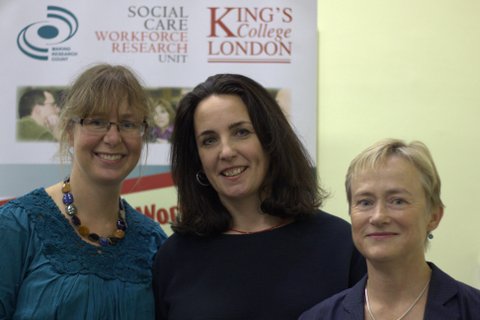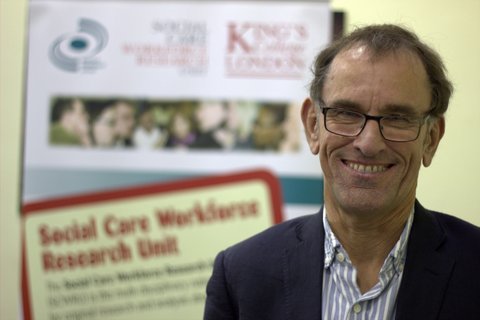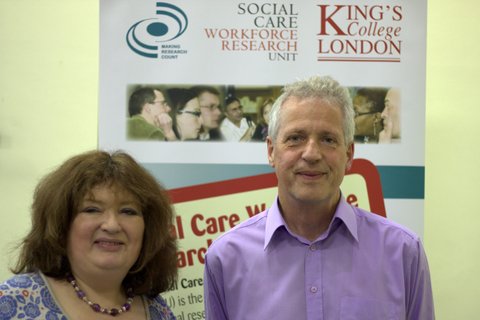 Joan Rapaport reports from the annual event co-hosted by the Social Care Workforce Research Unit and Making Research Count. The day started with a presentation from a user-led study. (1,173 words)
Joan Rapaport reports from the annual event co-hosted by the Social Care Workforce Research Unit and Making Research Count. The day started with a presentation from a user-led study. (1,173 words)
‘The Girls Who Kicked the Hornet’s Nest’: Perspectives from a user-led study on service user experiences of mental health related violence and abuse in the context of adult safeguarding: Dr Sarah Carr, Associate Professor of Mental Health Research, Middlesex University and Alison Faulkner, Independent Survivor Researcher, Mental Health.
‘It’s rather like writing a dark thriller’ were Sarah Carr’s opening comments regarding the research into service user experiences into and concepts of targeted violence and hostility, and prevention and protection. This small-scale exploratory study, led and entirely conducted by mental health service users, fills a gap in safeguarding research. It further provides an embedded knowledge exchange approach between service users, practitioners and agencies throughout the research process. The interviews, still in progress, reveal distressing accounts of violence. Isolated incidents are often located in a wider context of abuse. Some interviewees say that the interviews are the first time they have been able to tell their whole story. The study’s distress protocol for interviewers and interviewees is an essential component of the research design. Alison Faulkner commented that interviewees, despite the distress caused by resurrecting painful events, wanted the chance to share their experiences after taking necessary breaks.
Whilst the stories are as yet unanalyzed, underlying themes of power and vulnerability are emerging. Stories relate to employment, housing, neighbourhood, friends and family contexts and also mental health and social care services. Alison indicated that it may not be easy to tease out the reasons for the abuse, especially where multiple factors such as physical disability are also at play. Most of the interviewees are women. So far, few of the interviewees have been engaged with adult safeguarding services.
Sarah said it was intended that once all the research stages had been completed, an event would be held to publicize the findings.
How to help when being hindered? Professional responses when faced with third parties preventing access to adults at risk: Dr Martin Stevens, Senior Research Fellow, SCWRU, King’s College London.
Martin Stevens described legal and practical problems that can obstruct practitioners when carrying out safeguarding investigations. Alleged abusers may prevent the person in question from being interviewed in private or even refuse to answer the door. In some cases individuals may be reluctant to be interviewed on their own, adding to suspicions of third party influence. If living alone, they may also refuse to allow entry into their homes. What is not known is how frequently these situations occur or why some practitioners seem able to resolve them.
He outlined Department of Health Policy Research Programme research being undertaken at SCWRU still in progress into adult safeguarding practice. The evidence suggests that practitioners collaborate with a range of health and social care agencies, the police, family, friends, neighbours and even gas engineers when trying to overcome blocked access to an individual considered at risk. Whilst different legislative positions exist across the UK, arguments prevail for and against having a power of access in respect of an individual deemed to have decision-making capacity. Those in favour point to evidence of need, the damaging impact of ongoing abuse and the value of a legal power in assisting negotiations. Those against highlight the potential to exacerbate the problems under investigation, to damage the client/ professional relationship and to encourage practitioners to take short cuts, rather than a more considered approach. The literature suggests that socially mediated conceptions of privacy, vulnerability and autonomy may govern practitioners’ approaches to intervention, ways of managing hindering tactics, and interpreting decision-making capacity.
The next stage of the research is a national survey and interviews with practitioners, to find out what assists in gaining access to people who may be hard to help.
Whole family approaches to reablement in mental health: Professor Jerry Tew, Professor of Mental Health and Social Work, University of Birmingham.
Jerry Tew explained that the focus of this National Institute for Health Research School for Social Care Research funded study was to investigate the value or otherwise of ‘whole family’ approaches in achieving social reablement outcomes, such as maximizing choice, empowerment and social participation, for people with mental health difficulties. Four models of ‘whole family’ intervention were examined. All aimed to facilitate the renegotiation of family relationships to support service user reablement. Three were based on family therapy approaches and had varying lengths of duration. The fourth, the Family Group Conference, traditionally associated with children’s services, was more pragmatically orientated. Here the focus was on problem solving with the family supported to agree a plan of action amongst themselves.
Whilst all of the models demonstrated the potential to achieve positive social reablement outcomes, none had 100 per cent success. Professor Tew said the evidence suggested in respect of all models, that the pre-existence of entrenched family difficulties rather then the severity of a mental health problem, may be the main predictor of poor social reablement outcomes. However, the Family Group Conference was shown to provide the most explicit focus on empowerment and social participation through the recovery process. The study highlights the importance of tailoring models to suit family needs and also integrating family work with the service user’s care plan to maximize the potential of successful social reablement.
Wellbeing and connectedness: lessons from projects creating new mental health support roles: Dr Vanessa Pinfold, Research Director, the McPin Foundation.
Vanessa Pinfold said that much mental health research appeared not to take account of social factors. To thrive, mental health research required a much broader base than at present to consider the environmental, planning, political and sociological issues that have a profound impact on service users’ lives. Academics and charities such as the McPin Foundation are advocating change.
She described five research projects already, or on the point of being piloted, in urban and rural settings. These arose out of the findings of an earlier study of a range of practitioners that suggested ownership of social network development was lacking but should be taken forward. The five pilots, designed to offer alternatives to medical approaches, focus on the development of new social networking roles. For example, Care Partners provides a new bridging role between primary and secondary care provision. Community Navigators will develop a new buddies role to help people with complex anxiety and depression in secondary care settings. The study will assess the impact of the new roles on social work practice and how these may differ from others in conventional mental health settings. It will also ask how system barriers can be overcome to avoid the roles from being dragged back into NHS ways and what is required to raise the profile of ‘the social’ to centre stage in mental health research.
Concluding comments
Jo Moriarty endorsed Vanessa Pinfold’s comments that ‘research does not operate in a vacuum’ and the importance of dialogues between researchers, practitioners, people using services and carers to consider research priorities and the implications of research findings.. It was also important to involve commissioners so that fresh ideas arising out of research developments could be more easily adopted, if justified.
The conference closed at 4pm.
Joan Rapaport is Visiting Research Fellow at the Social Care Workforce Research Unit in the Policy Institute at King’s. Presentations from the day are available.


